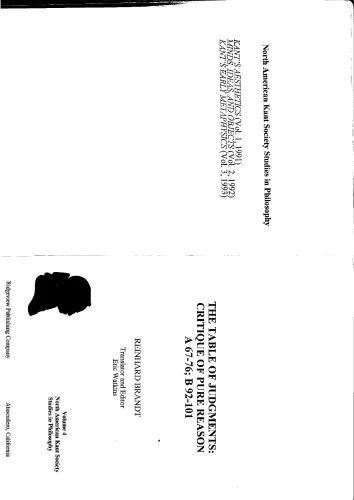The Table of Judgments: Critique of Pure Reason A67-76; B92-101
4.7
Reviews from our users

You Can Ask your questions from this book's AI after Login
Each download or ask from book AI costs 2 points. To earn more free points, please visit the Points Guide Page and complete some valuable actions.Introduction
Welcome to a thorough exploration of "The Table of Judgments: Critique of Pure Reason A67-76; B92-101," a critical examination of Immanuel Kant's monumental work, the Critique of Pure Reason. This book delves into a crucial segment of Kant's philosophy that forms the backbone of his critical project, offering readers a granular dissection of his approach to judgments.
Detailed Summary of the Book
In "The Table of Judgments," Reinhard Brandt and Eric Watkins meticulously explore Kant's concept of judgments as outlined in the Critique of Pure Reason. This section, spanning pages A67-76 and B92-101, is seminal in laying down the foundation for Kant's critical enterprise. The book provides a layer-by-layer analysis of Kant’s logical judgments, which are crucial for understanding his revolutionary approach to epistemology and metaphysics.
Kant's table of judgments delineates different forms of judgments—universal, particular, affirmative, negative, categorical, hypothetical, and disjunctive—each serving a unique role in human cognition. Brandt and Watkins offer an in-depth commentary on these forms, explaining how they interrelate with Kant's categories of understanding. Their aim is to clarify how judgments operate within the greater architecture of Kant's philosophy, influencing how knowledge is both structured and apprehended.
The book probes the significance of Kant's classifications, their philosophical implications, and how they underpin his assertions about the nature of human experience and the limits of human understanding. Through this concentrated study, Brandt and Watkins provide invaluable insights into the complexities of Kantian thought, challenging readers to reevaluate common interpretations and appreciate the nuanced articulation of Kant's critical methods.
Key Takeaways
- Understanding Kant's table of judgments is crucial for comprehending his critical philosophy.
- Kant categorizes judgments into universal, particular, singular, affirmative, negative, categorical, hypothetical, and disjunctive, each with distinct roles.
- The relationship between judgments and categories highlights the systematic nature of Kant's Critique of Pure Reason.
- Brandt and Watkins offer new interpretations that challenge traditional readings of Kant's work.
Famous Quotes from the Book
"Through a detailed analysis of the table of judgments, one gains profound insights into the scaffolding of Kant's synthetic a priori knowledge."
"Judgments are not merely linguistic expressions but are fundamental instruments in the architecture of Kantian epistemology."
Why This Book Matters
"The Table of Judgments: Critique of Pure Reason A67-76; B92-101" is invaluable for students and scholars of philosophy, particularly those intrigued by Kant's unparalleled influence on modern thought. By focusing on a specific but critical portion of Kant's Critique, the book provides the depth required for a profound comprehension of Kantian logic and the underpinnings of transcendental idealism. Brandt and Watkins’ analysis not only aids in demystifying Kant's often challenging prose but also equips readers with the conceptual tools to apply philosophical reasoning to a wide array of contemporary issues.
This work stands as a testament to the continued relevance of Kant's insights, encouraging the ongoing exploration and application of his ideas. "The Table of Judgments" enriches the literature surrounding Kantian thought, serving as a crucial guide for anyone seeking to navigate the complexities of one of philosophy's greatest works.
Free Direct Download
You Can Download this book after Login
Accessing books through legal platforms and public libraries not only supports the rights of authors and publishers but also contributes to the sustainability of reading culture. Before downloading, please take a moment to consider these options.
Find this book on other platforms:
WorldCat helps you find books in libraries worldwide.
See ratings, reviews, and discussions on Goodreads.
Find and buy rare or used books on AbeBooks.
1317
بازدید4.7
امتیاز50
نظر98%
رضایتReviews:
4.7
Based on 0 users review
"کیفیت چاپ عالی بود، خیلی راضیام"
Questions & Answers
Ask questions about this book or help others by answering
No questions yet. Be the first to ask!


